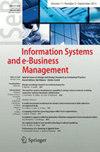数字工业平台的网络效应测度:迈向平衡的平台绩效管理
IF 3.6
4区 管理学
Q3 BUSINESS
引用次数: 0
摘要
企业越来越多地建立数字工业平台,以应对工业物联网(IIoT)范式的适应。数字平台在许多以平台为中介的行业中取得的巨大成功可以追溯到网络外部性的点燃。然而,在工业物联网领域,网络外部性的影响仍在讨论中,对平台公司来说,测量网络外部性仍然是一个挑战。本文概述了现有研究中如何测量网络效应,得出了工业物联网网络效应的三个维度:(1)生态系统效用,(2)互补性,(3)兼容性。这一概念进一步应用于与数字工业平台组织的从业人员的实证研究中,通过制定20个关键绩效指标(kpi)来实现对工业物联网网络效应的绩效衡量。基于实证研究结果,本文提出了一个均衡平台管理框架。利用平衡计分卡的目标,该框架强调了在昂贵的网络效应模拟和平台收益方面的矛盾观点之间的权衡,平台经理需要平衡这些观点。KPI组合可以支持平台管理人员实现框架。本文章由计算机程序翻译,如有差异,请以英文原文为准。
Measuring network effects of digital industrial platforms: towards a balanced platform performance management
Abstract Firms increasingly establish digital industrial platforms to cope with the adaption of the industrial internet of things (IIoT) paradigm. The tremendous success of digital platforms in many platform-mediated industries can be traced back to the ignition of network externalities. However, the impact of network externalities is still under discussion in the IIoT domain, and their measurement remains a challenge for platform companies. This paper outlines how network effects were measured in the existing research, deriving three dimensions of network effects for IIoT: (1) ecosystem utility, (2) complementarity, and (3) compatibility. This conceptualization is further used in an empirical study with practitioners from digital industrial platform organizations to enable performance measurement of network effects in IIoT by developing 20 key performance indicators (KPIs). Based on the empirical study results, this paper proposes a framework for balanced platform management. Utilizing the goals of a balanced scorecard, the framework emphasizes the trade-off between the contradicting perspectives on costly network effect simulation and platform earnings that platform managers need to balance. The KPI portfolio can support platform managers in implementing the framework.
求助全文
通过发布文献求助,成功后即可免费获取论文全文。
去求助
来源期刊
CiteScore
6.20
自引率
11.10%
发文量
18
期刊介绍:
Nowadays, in the age of information technology and the internet, the creation and maintenance of business models has to consider the latest developments in information technology to ensure competitiveness and long-term success of the enterprise. The aim of Information Systems Management (ISM) is to integrate information technology into business models and business processes to explore its potential to meet the business goals. Many international journals in the field of information systems (IS) or information management (IM) focus primarily on the quantitative analysis of information systems phenomena, especially through the use of empirical studies. However, research on qualitative analysis, development, and deployment of information systems is not covered sufficiently by the existing international IS journals. Therefore, the journal Information Systems and e-Business Management (ISeB) focuses on the core tasks of Information Systems Management, the conceptual analysis, design, and deployment of information systems, as well as on all e-business related topics. 1. Editorial objective
The central aim of the journal ISeB is to publish original, well-written, self-contained contributions that elucidate novel research and innovation in information systems management and e-business which advance the field fundamentally and significantly. Published quarterly, the journal will:
- Provide a vibrant forum for both academicians and industry specialists to explore the information systems and e-business management field
- Bring innovative research on all aspects of information systems management from analytical, behavioral and technological perspectives
- Enable rapid dissemination of latest research and innovation, supported with a double-blind peer review process. 2. Nature of topics
The function of information systems management is the use of information technology (IT) to meet the information requirements of a company. Core tasks of ISM are the generation of project ideas (e.g. identification of business opportunities enabled by new information technologies), conceptual analysis, design, and integration of information systems.
Submissions to ISeB should have a clear business focus and use appropriate information systems methodologies. They should either be founded on theory or should have proven their value based on prototypes and their beneficial application in the field. The general applicability of the concepts presented is strictly required. Case studies are welcome, if the insights presented allow general applicability. Moreover, empirical studies are welcome if clear research questions with relevance to the field of information systems and e-business management are given and the studies are carried out correctly.
ISeB topics focus on (but are not restricted to) the following areas: - Information Modeling:
The central task of information systems modeling is the conceptual specification of information systems from the business point of view. Information modeling includes the development or the application of high-level modeling techniques used for conceptual modeling, e.g. event-driven process chain (EPC) for process modeling, entity-relationship model (ERM) for data modeling, and object-oriented methods like the unified modeling language (UML).
- Domain-Specific Information Systems:
Different industry domains (e.g. manufacturing, retailing, or finance) are characterized by different requirements to information systems that are reflected in different IS architectures for specific domains. The development and maintenance of information systems in an industry domain can be supported by these architectures. Either the development of generalizable domain-specific architectures or the employment of such architectures in practice can be discussed.
- E-Business Management (intra-organization al and inter-organizational information systems):
Possible sub-topics include the development and deployment of IS for electronic commerce and supply chain management, market places, new business scenarios enabled through new technologies. Based on a business strategy, submissions have to clearly state how the strategy can be operationalized using IS. - Information Systems Development:
The development and deployment of large-scale IS (e.g. enterprise resource planning software) requires the use of appropriate software engineering methodologies, procedure models, and project management. Possible research areas are the development of software engineering methodologies, procedure models, and the design of project management methods. Empirical studies on IS development may focus on the application of well-founded methods in practice.
- Information Technology Management:
The function of information technology management is the provision and operation of the technical infrastructure and the planning of the technical orientation of information systems in an enterprise. An important aspect is the impact of changing information systems on organizational structures and processes – and vice versa. In this context, the use of information technology to realize a business strategy efficiently can be analyzed.
- Latest Information Technology Developments:
Latest developments in information technology have to be evaluated to explore potentials to generate new business strategies. Current topics and trends to be evaluated for business use are e.g. business intelligence systems, agent technology, and workflow management systems. Officially cited as: Inf Syst E-Bus Manage

 求助内容:
求助内容: 应助结果提醒方式:
应助结果提醒方式:


